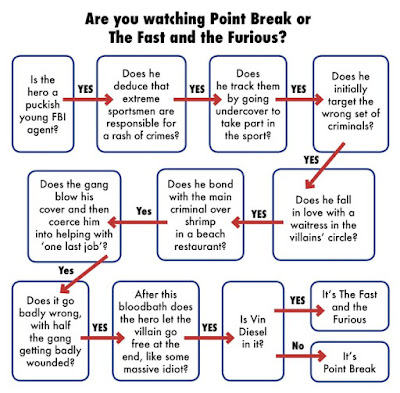1
Craig Raine is a poet, but he wants none of your pearl mist and opium dreams. Here he is, in 1979, writing about an experience nearly every writer of his era already had—using a phone:
In homes, a haunted apparatus sleeps,
that snores when you pick it up.
If the ghost cries, they carry it
to their lips and soothe it to sleep
with sounds. And yet, they wake it up
deliberately, by tickling with a finger.
It’s a truism that a great artist takes an experience that’s familiar and, through writing, makes it new. When William Carlos Williams tells you about eating the plums that were in the icebox because it is common and he is excited about the challenge of making it live again.
2
Another poet called both sex and death “the horizontal mysteries”. This is the opposite kind of thinking.
Writing a game mechanic often requires this kind of opposite—rather than wanting to know how to make familiar experiences different, we want to boil different experiences down to similarities.
What do seemingly disparate experiences have in common? What widely separate necessities can be explained with one single mechanic?
Wait are Magneto’s powers just telekinesis but less? Can the crossbow rules work just like the gun rules? Can those work like the “call lightning” rules? Can the mechanic we use in the fantasy game for the power of the crystal ball be used in the spy game for the quality of the surveillance drone?
3
This is part of a tension in game writing: Engaging writing is often about making the familiar seem new, game writing is often about making what appears to be a wide variety of phenomena expressible using a small number of tools. Some examples:
-Reskinning:
Sometimes a killer monkey with a knife and a goblin just have the same stats. So you’re reading along and this killer monkey seems pretty cool and you get to the stats and it’s, ok, nothing special. Is that a little uninspiring? But then you use it at the table and your players are like “Oh whoa, remember the killer monkey?”
-Games' "Library content":
Library content is that store of creature abilities and other re-usable ideas that come with a game. A hallucinogenic mushroom and a hall of mirrors might both rely on the Confusion spell for their mechanical effect, even though they're different things.
-Abstract stats:
Nights' Black Agents has vampires with an ability called "Monstrosity"--i.e. how intense any given monstery power they use is. On paper, the creature can fly, resist magic, climb walls, charm people, but lower down on the paper it's just "Monstrosity: 4".
-Tropes:
“Point Break and the Fast and Furious are basically the same movie”. Well, they aren’t, but…
 |
| (Chart by Andy Ryan) |
4
One of the things you see people who can't write (at least in the first--at the top of this page--sense) complain about is "lazy writing" or "bad writing". This is, so far as I'm aware, never used to say that writing is bad like somebody wrote his cloak was as black as sin, and instead always means that someone used a common trope the complainer does not like. Or, more precisely, used a trope the complainer discovered after deciding they didn't like the work for some other reason.
It's a strange formulation since the phrase itself is a lazy shorthand--the critic substitutes "writing" for "plot" and "uses a common trope" for "bad". Write better.
5
When you actually do the work of game writing, switching between the two modes--describing the lush variety of things there are to put in front of players versus finding the DNA that unites them--can be a little dizzying.
If you keep an eye, it's easy to see who is good at only one or only the other.
-
-
-










3 comments:
Interesting.
I confess I use the term "lazy writing", though it means another thing for me, more about "too lazy to proofread the text and notice you didn't fix the dialogue" sort of thing.
And, yes, Magneto's powers are sort of like this, but he has a ton of cool Power Stunts.
“... rather than wanting to know how to make familiar experiences different, we want to boil different experiences down to similarities...”
Is this not the operation of metaphorical thinking that is a element in poetics? Why not suppose that beneath its face, game mechanics are mathematical in nature; they describe the reality of the game world by the relationships of numbers. It’s useful because its predictable , consistent, and rigorous. But if you feel that contrasting the poetic world of the imagist is helpful to excavate the necessities of what it takes to write a game then by all means, do so.
@Nyx
A good writer of poetry or fiction often points out similarities in disparate things as well, but it was not this element I was focusing on.
I was referring more to the style of description most often characteristic of the granular parts of writing they call "style". Like: some people say "my car" and some say "my powerful daimler"
Post a Comment